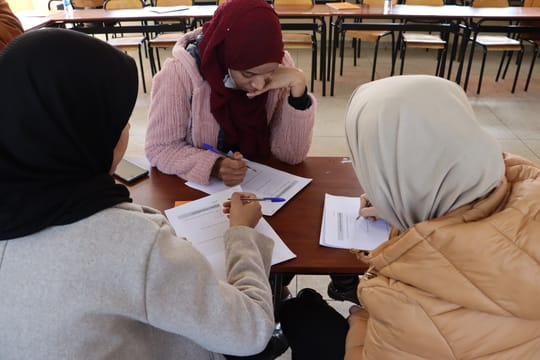Governance: An Effective Mechanism for Sustainable Development

The High Atlas Foundation, in partnership with Cadi Ayyad University, the Faculty of Legal, Economic and Social Sciences, and the Legal Clinic Association for Studies and Research, and with the support of the National Endowment for Democracy, organized a training course for students of the legal clinic on the subject of governance under the supervision of Dr. Mohammed ben Talha Doukkali, university professor.
Sometimes, governance refers to the management of public affairs, as it is a concept that covers organizational structures and the activities of the central, regional and local government. In the case of this training, though, the most accurate definition of governance is the achievement of economic and social development, and this concept was a new and useful mechanism for discussing sensitive issues such as democracy, human rights, and development in this type of setting.
Participants learned that, to activate the principle of governance, there must be major parties represented in not just the government, but also the private sector and civil society. Therefore, governance is characterized by basic principles that are manifested in openness, participation, responsibility, effectiveness, cohesion and coexistence.
Accordingly, governance has become a widespread term; everyone talks about it, despite the problems of definition and scrutiny of the concept and its multiple angles. Governance has a legal and basic demand and it forms the basis for a strategic approach to management of civil affairs.
Moreover, Dr. Ben Talha Doukkali went on to explain that governance is one of the most important terms discussed in the early eighties and began to be used by the World Bank in 1989, in the context of emphasizing that the failure of sustainable development in developing countries is primarily due to poor management and planning and the corruption of political systems. He also helped the audience to recognize that the development crisis in Africa is a crisis of good governance because development needs more democratic participation and oversight.
Therefore, the issue of corruption in political systems, he pointed out, is mainly due to the absence of democracy, and the weakness of management is due to the absence of accountability, integrity and transparency. The absence of judicial oversight and ethics as well as poor planning is mainly due to the lack of vision, scientific data to drive decisions, and effective policies, coupled with a tendency toward short-term planning.
Despite all the constraints, the reality is that effective distribution of responsibilities among stakeholders ensures proper functioning of governance structures and enriches leadership skills in order to achieve comprehensive sustainable development for all economic, social and political poles.